All the Different Types of Wedding Officiants to Help Pick Yours
One of the most important vendors you'll secure ahead of your big day is undoubtedly your wedding officiant, or a legally authorized individual whom you pick to orchestrate your wedding ceremony. They're the ones who traditionally pronounce you and your new spouse officially married.
The role of an officiant has changed dramatically in modern times. In fact, the couple often had little-to-no choice in the matter as to who would wed them; it was almost always the head of the house of worship to which they belonged. It was also just another formality that marked the beginning of a marriage between two people. Nowadays, officiants come in all forms—religious and non-religious—and often work hard to customize the ceremony to the couple's unique personalities and create an engaging experience for the audience, explains Lucy Felix, wedding officiant and owner of Touch of Elegance in Riverside, California. "I like to make my ceremonies fun and entertaining by retelling the couple's love story, how they met, the first date, their first kiss, the first 'I love you,' and the proposal, as well as include little anecdotes from a few of their loved ones that talk about what they're like as individuals and as a couple," she says.
Another big change has come in the form of technology, Felix explains. "Anyone can get ordained online in under 10 minutes for about $30—and there are more women in the field now as well," she adds. This makes the prospect of choosing your wedding officiant a bit more, well, intricate than it used to be. Now, you have more options, which requires you to do a bit more research before settling on a single person to carry out your nuptials. It's definitely worth browsing officiants near you on a site like The Knot Vendor Marketplace as a starting point.
Here, we asked wedding pros to share the different types of wedding officiants out there—and to provide some helpful tips for how to choose yours wisely.
Religious Officiant
A religious minister is a wedding officiant who has received authorization from their denomination to perform ceremonies and may also offer premarital spiritual counseling and incorporate religious traditions into the ceremony, such as readings or prayers, explains Orsella Hughes, ordained, professional wedding officiant based in Connecticut and owner of Serenity Ceremonies by Rev. Orsella. "Typically, this type of officiant is ideal for couples who are looking for a traditional and faith-based wedding ceremony," she says. "Even with traditional elements in the ceremony, a religious minister may offer personalization and incorporate unity ceremonies in the wedding."
Non-Denominational Ordained Minister
"A non-denominational ordained minister is a wedding officiant who has been ordained but does not belong to any specific religious denomination," Hughes explains. "Like the religious minister, they, too, may offer a more personalized and modern approach to ceremonies, often incorporating elements from different faiths or cultural traditions." She recommends a non-denominational ordained minister for couples who are seeking a less traditional or interfaith ceremony. "Unlike ceremonies officiated by religious ministers, a non-denominational ordained minister may discuss with the couple using universal faith language as opposed to the mention of God," she adds.
Justice of the Peace
There are also civil officiants such as a Justice of the Peace or elected officials who can legally perform marriage ceremonies. "They offer a simple and straightforward approach to weddings; however, this doesn't limit them from including unity ceremonies, personalization and writing an amazing love story of the couple," says Hughes. "They do not have any religious affiliation and focus on legally binding the couple in marriage and are more ideal for couples who prefer a simple and non-religious ceremony."
Professional Wedding Officiant
A professional wedding officiant performs weddings for a living; whether it's their full- or part-time job, it is something that they specialize in and have made a career out of. "A good professional would be well versed in weddings, a great speaker and how to command a room, but the couple could seek out someone who can perform a humorous ceremony, a culturally based ceremony or maybe even a themed ceremony with the officiant in costume, depending on their preferences, explains Loren Petrowski, officiant and owner of Marry You in Hawaii.
Judge
A judge may serve as a wedding officiant, a circumstance that is most common in courthouse weddings. "This is the perfect choice for couples who desire a quick solemnization ceremony with marriage license signing only," says Hughes. "When you choose this type of ceremony, there will not be an opportunity to personalize your ceremony or include any special rituals or traditions, however, it is a cost-effective and efficient option for couples who simply want to make their marriage official in the eyes of the law."
A Friend or Family Member
Nowadays it's not uncommon to opt to have a friend or family member officiate your wedding—even if they've never done so before. This officiant, Felix explains, is typically someone who personally knows the couple, like an uncle, brother, cousin, close friend, etc., who got ordained online—they have little to no experience performing a wedding but are "pretty sure they can do it." "Couples who want to save money often choose a relative to perform the ceremony, but unless this person is comfortable with public speaking, the lack of experience will often show," she says. "Make sure they do their research on the proper procedures in your county to ensure your marriage is legal."
























